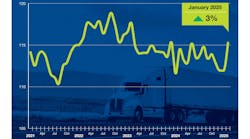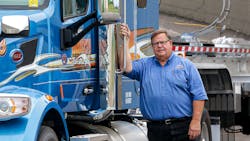Kenworth to retire legacy truck models
Airbus rolls out sustainable aviation fuel
Trucker Path expands navigation features
BeyondTrucks adds fuel card management
ATA: Truck tonnage surges 3% in February
Most days, Dennis Gavin is energized by a sense of purpose in his work. He knows his father would be proud of how far Caledonia Haulers has come.
Other days, he just feels tired.
A lifetime of unwavering devotion to one’s family, friends, and community will have that effect on a person. And as the liquid bulk transportation company’s owner, president, and CEO wearily attests, the trucking life isn’t for everyone. “It’s not getting any easier,” he said. “We’ve been in business 64 years, and there are new challenges every year, whether it’s emissions, people, equipment, or regulations. It never ends.”
Dennis jokes at his age, 65, he should be in Florida, instead of running the show. Truth is, if he went anywhere, it’d be his farm, but he’s too busy securing a stable future for the business his father helped establish to consider leaving it behind. Not until he ensures the enduring prosperity of everyone involved.
“I’ll be here for a while yet,” he vowed.
The pandemic made sure of it. In a key step toward establishing a path forward for the Caledonia, Minnesota-based foodgrade hauler, Dennis planned to christen a state-of-the-art, second tank-cleaning facility at their new Janesville, Wisconsin terminal early this year. Because of supply-chain issues, they’re now aiming for summer, delaying the for-hire carrier’s efforts to boost tank-cleaning capabilities and efficiencies.
But that’s only part of a survival strategy that includes a fundamental shift in their approach to recruiting: Instead of sending drivers wherever new customers ask them to go, they’re thinking more about where drivers want to go. And by leveraging the availability of corn sweetener, a commodity that is plentiful within the nationwide company’s regional footprint, they’re getting drivers home more often, and growing business.
Those kinds of solutions appeal to Dennis, who’s determined to conform to changing times, while also preserving the family-operated company’s well-established reputation for elite, fleet-owned equipment, exacting food-safety standards, first-rate service—and making sure every employee shares in Caledonia’s success.
Because this owner’s selfless dedication is an energy that is never exhausted.
“It takes a lot of good, talented people to make this thing go,” he said. “It’s not just me. It’s everyone, from our shop to our operations, recruiting, and safety.
“It’s a team effort. It’s not Dennis Gavin.”
Bleeding blue
Caledonia started in 1958 when six men—including Joe Gavin, Dennis’s father—hauling canned milk from farm to creamery recognized the dairy industry was changing and invested $200 each to buy a bulk tank trailer. They grew by further evolving with the needs of their rural community, first adding grain and livestock hauling, then expanding into other foodgrade products as longer routes enabled new backhauls.
Joe served as Caledonia’s first president until 1992. Then his son, who grew up around the operation, followed in his footsteps, becoming a shareholder in 1985 and officially succeeding him as president in 1995. And through a long-standing policy of buying back shares as partners exited the business, Dennis has been the company’s sole owner since 2013. “Now it’s up to me to figure out where we go from here,” he said.
Fortunately for those who bleed Caledonia blue, he’s the right man for the job.
As the eldest of nine siblings, several of whom are involved in the business, caring for others comes naturally to Gavin. As long-time confidant Chuck Mierau explains, he’s been a brother, father, boss, and advisor to all at one point, steeling him with the patience and fortitude needed to guide a business through highs, and lows.
Through it all, he’s remained humble and approachable, with a door that always is open to anyone with a question or concern.
“I remember times when money was tight,” said Chuck, a friend and part-time driver who took on the roles of project coordinator, and hazard analysis and critical control points (HACCP) leader, in 2015. “We sat and talked countless times in that tough, growing-pain stage in the 90s, when business was there but we didn’t quite have the capital to keep going, and he did a terrific job of managing through those times.”
Today, the community-oriented hauler boasts three Midwest terminals and employs 275 full-time employees (as well as many part-timers). Among them are two of Dennis’ brothers, Glenn “Buck” Gavin, a shop technician, and Dean “Ole” Gavin, a driver manager; Dennis’ children, Zach, who’s 26, and Ashley, 24; and Chuck’s son, Zach Mierau, Caledonia’s operations manager, who’s helping lead the business through the latest challenges.
“They think more alike than we do,” Chuck joked of their relationship. “There’s a real, honest, down-to-earth connection between them.”
Of course, Dennis has a way of making everyone feel like family.
“He’s one of those guys who, once you know him, you can’t tell him no,” Zach Mierau said.
Sweetening the deal
Caledonia started hauling sweetener for Roquette America in Keokuk, Iowa, back when Dennis still dispatched. They got away from sweeteners as other foodgrade hauls, like edible oils and liquid yeast, took off, but leaned back in during the pandemic, while adjusting to the swelling shortage of longhaul drivers. “We’ve had good luck hiring drivers for the corn sweetener industry,” Zach Mierau said. “The lanes work for us.
“So we’ve tried to grow driver-wise by looking at lanes, and asking ourselves, ‘What would a driver, in today’s world, want to haul, and where would they want to go?’ That’s completely different from how we used to think. In the past, wherever the customer told us to go, we went. Nowadays you’ve got to be more careful, in thinking about projects, and what type of freight you’re looking to haul to attract drivers.”
Caledonia now has 15 drivers who are dedicated to transporting corn sweetener for Roquette, ADM, Cargill, and Tate & Lyle, among others, and could double that tomorrow if they found the drivers, Zach Mierau said—an effort elevated this year by the company’s first time as a Best Fleets to Drive For finalist.
In total, the company hauls more than 200 products, including apple juice, honey, liquid smoke, and soybean oil, with a fleet of 225 trucks and 400 trailers, across 48 states and Canada—and 99% are liquid foodgrade. A diverse mix protects them against seasonal shifts and keeps drivers busy year-round. The liquids they haul go into everything from Subway bread, and Hostess and Sara Lee snacks, to Tootsie Rolls and gummy bears. “It’s amazing the different types of products that are made out of certain commodities,” Dennis said.
Caledonia still hauls milk, too. Dairy’s a smaller portion of the freight mix now, but it has 40 trucks hauling milk off farms, and a milk transfer station. “Nowadays, the trucks are bigger, so a lot of that farm pickup transport goes directly to the end processing plant,” Dennis said. “We still have our transfer station available, and we still use it a little bit, but it’s more or less to keep it qualified as a milk-shipping plant, for emergency-backup situations.”
The company also hauls organic products, including grass- and corn-feed organic milk.
Dennis said they average 14,000 farm-route loads and 26,000 over-the-road loads a year, and travel more than 25 million miles annually—all in fervent service of long-standing customers who value their devotion. “We’re not afraid to take on the late-notice loads and extra deliveries,” Zach Mierau said. “Dennis has always made a culture of, when the customer calls, no matter what time of day or night, we find a way—even when we really don’t have a way of covering it—to get the extra load hauled or do that last-minute delivery.”
Challenges expected
Recent developments haven’t helped. The health scare exacerbated the driver shortage, and accelerated a generational shift in what people want from work, Dennis said. Technicians also are hard to find, even as highly trained technicians become more essential to keeping today’s high-tech equipment running.
Other challenges include rising costs, supply-chain disruptions, and capacity constraints.
“What’s next?” Dennis wondered.
His most confounding problem is the frequency of emissions equipment breakdowns, which disrupts operations. The EPA SmartWay Transport Partner is doing its part to protect the environment, spec’ing fuel-efficient engines and implementing green tank wash practices, but keeping emissions systems running is more difficult than it should be, Dennis argued, requiring him to devote one mechanic to their maintenance.
“Truck manufacturers just don’t have it figured out,” he said. “There are so many problems, whether it’s a wiring issue, harness issue, or sensor issue. And nowadays when you’re on the road and you call a shop, it’s going to be a week before they can look at it. So you’ve got to relay the load. And we’re hauling foodgrade products that have to be somewhere.
“We’re not hauling toilet paper, which can sit in a dry van forever if necessary. Our products are perishable, so we go to great lengths to find another truck to get the load relayed. I never thought in this day and age we’d spend that much money, time, and resources trying to make trucks run up and down the road.” Transportation companies also must buy trucks with extended factory warranties that don’t come cheap in order to receive the California Air Resources Board (CARB) sticker required for runs to the West Coast.
In addition to shifting focus to growing regional operations—another foundational change for a company that, for years, grew by expanding OTR services—Caledonia has adjusted, and increased driver pay several times over the last five years. Instead of paying strictly by the mile, as in years past, it’s now compensating them for any downtime, loading and unloading, border crossings, and more. Most of its drivers now earn between $75,000 and $85,000 annually, Dennis said, and he’s already planning another round of raises.
“We’ve just got to figure out how we’re going to pay for it,” he said.
Product protection
Caledonia has food safety all figured out.
Ensuring compliance with the Food Safety Modernization Act has been Chuck’s top priority since rejoining Caledonia. As HACCP team leader, he developed and implemented its systems for preventing cross contamination through the analysis and control of biological and chemical hazards during transport and cleaning.
The company’s program includes 37 critical control points for each type of wash, including Kosher, defined limits and corrective actions, meticulous monitoring and verification procedures, exhaustive record-keeping, and never-ending employee training—all reinforced through external audits by demanding customers. “We can go to bed confident everything is done right in the tank,” Chuck said. “Our rejection rate shows it.”
That’s why fleets travel hundreds of miles to the original Caledonia cleaning facility, which last year washed out 4,300 company and third-party tank trailers. It’s so clean, Hydrite Chemical Company, which makes foodgrade cleaning products, uses it. “When they trust a wash to clean their trailers, that says something about it,” Chuck said.
Hydrite also helped Caledonia, which solely utilizes organic sanitizers, reduce its use of cleaning chemicals by 11%, saving money and producing greener wastewater. And, in addition to scrutinizing prior products when planning loads, they consider product compatibility before washouts to discharge only well-balanced water.
“It’s the cleanest wash I know of,” Chuck said.
Cleaner living
The Janesville wash rack will take shipper confidence in Caledonia’s tank-cleaning ability to another level, he predicted.
The four-bay facility under construction on a 9-acre site formerly owned by Transport America will feature more automation, single-pass and recirculating systems for hybrid optionality, an allergen-free bay, and on-demand heat from highly efficient boilers that create 50% less condensation than Caledonia’s equipment.
Operationally, the location will help Caledonia address challenges in the foodgrade tank-cleaning industry. “Availability has tightened,” Zach Mierau said. “That has made it harder to get tanks washed on time.” Complications include the difficulties smaller operators face earning food-safety certifications and finding wash technicians; and ferrying trailers between numerous outside facilities is one of Caledonia’s greatest inefficiencies.
Dennis said the company spends $5 million a year on washouts. A second facility also will help reduce expenditures on cleaning its own tanks, and generate more revenue from commercial services in an area where foodgrade cleaning demand is higher than in Caledonia. And they’ll be able to get drivers in and out of nearby Chicago faster, improving driver satisfaction and turnaround times, and making trailer relays simpler.
“I can’t wait to get this new wash going,” Chuck said.
He thought it’d already be operational. But securing a wastewater discharge permit in Wisconsin is complicated, as is procuring ordinary building materials like PVC pipe and stainless steel amid persistent, pandemic-induced shortages. “I’ve never seen anything like it,” Chuck said. Yet Dennis remains as committed to local builders and suppliers as he is to supporting area parts distributors. If Chuck suggests he could find something cheaper or faster elsewhere, Dennis only asks, “How would they make their living then?”
Service with a style
Relationships with local dealers and service shops are equally important, Dennis said. That’s why Caledonia is a long-time buyer of Peterbilt trucks and Walker tank trailers. Caledonia is situated between two All-State Peterbilt dealerships, and there’s a Walker (now Wabash) service center between Caledonia and Janesville.
Most of Caledonia’s 316-grade stainless-steel tank trailers are 6,600- and 7,000-gallon, single-compartment tankers outfitted with Michelin super-single tires, tire inflation systems, and Samsara devices that allow the carrier and its customers to track locations and product temperatures through FourKites. “Samsara GPS on trailers has been the most useful tool we’ve seen yet on the dispatch side,” Zach Mierau said.
Trucks are classic-looking 567s and sleeker 579s. About 25% are spec’d with PACCAR’s 12-speed automatic transmissions. The rest are 13-speed Eaton manuals. New trucks have PeopleNet electronic-logging devices (ELDs) and forward-facing Lytx camera systems—and only one is not company-owned. “It’s hard for owner-operators because of all the variables in bulk liquids,” Zach Mierau said. “They have to put special equipment, like PTOs and wet kits, on their trucks to pull our trailers, and many don’t want to do that.”
Senior drivers get to spec the company’s signature blue tractors with unique graphics and interior packages, promoting individuality and ownership without placing the financial burden of maintaining them solely on drivers. “It creates a sense of pride that, one, they’ve been here that long (15 years), and two, they had a hand in spec’ing a truck they drive up and down the road every day,” Zach Mierau said. “It sets us apart.”
Uncommon bond
Commitment to customers and community—a trait the company traces to its owner—further distinguishes Caledonia Haulers.
That’s why Dennis remains determined to see the business adapt and thrive.
He recently charged Zach Gavin with selling Caledonia’s old trucks, instead of trading them in, to capitalize on soaring used-truck prices, and he’s already planning a third tank wash on a new 10-acre site in Cedar Rapids, Iowa, where they currently lease a facility, while continuing to contemplate how Caledonia one day will proceed without him.
One thing he won’t consider is selling to private equity—no matter how many times they call, or how worn out he might feel.
He simply has too much liquid passion left in the tank.
“It wouldn’t be the same,” he said. “It’s much better to be locally owned.”










